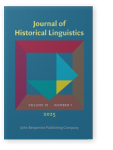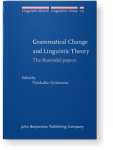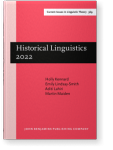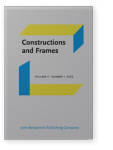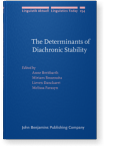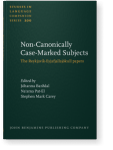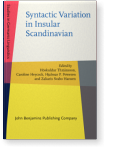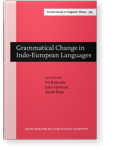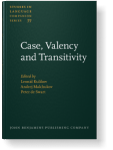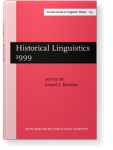Thórhallur Eythórsson
List of John Benjamins publications for which Thórhallur Eythórsson plays a role.
Journal
Title
Grammatical Change and Linguistic Theory: The Rosendal papers
Edited by Thórhallur Eythórsson
[Linguistik Aktuell/Linguistics Today, 113] 2008. vi, 441 pp.
Subjects Generative linguistics | Historical linguistics | Syntax
2025 日本言語政策学会 / Japan Association for Language Policy. 言語政策 / Language
Policy 10. 2014: Identifiable processes in the history of Icelandic Historical Linguistics 2022: Selected papers from the 25th International Conference on Historical Linguistics, Oxford, 1–5 August 2022, Kennard, Holly, Emily Lindsay-Smith, Aditi Lahiri and Martin Maiden (eds.), pp. 215–231 | Chapter
Policy 10. 2014: Identifiable processes in the history of Icelandic Historical Linguistics 2022: Selected papers from the 25th International Conference on Historical Linguistics, Oxford, 1–5 August 2022, Kennard, Holly, Emily Lindsay-Smith, Aditi Lahiri and Martin Maiden (eds.), pp. 215–231 | Chapter
Predicate-specific oblique subjects have emerged throughout the history of Icelandic. The novel contribution of this paper is spelling out the precise mechanisms of the changes. We focus on three general processes: Oblique-Case Substitution (OCS), Case-Preserving Anticausativization (CPA) and… read more
2019 The alternating predicate puzzle: dat -nom vs. nom -dat in Icelandic and German Constructions and Frames 11:1, pp. 107–170 | Article
A long-standing divide between Icelandic and German in the literature takes for granted that there are non-nominative subjects in Icelandic, while corresponding arguments in German have been analyzed as objects (Zaenen et al. 1985; Sigurðsson 1989). This is based on two differences between these… read more
2019 Chapter 4. Stability and change in Icelandic weather verbs: Syntax, semantics and argument structure The Determinants of Diachronic Stability, Breitbarth, Anne, Miriam Bouzouita, Lieven Danckaert and Melissa Farasyn (eds.), pp. 69–100 | Chapter
Contrary to previous claims, weather verbs in Icelandic are not “no-argument” predicates. Both in Old and Modern Icelandic they can appear with an NP either in nominative, accusative or dative case. It can be shown that in Modern Icelandic the NPs are subjects, and this is likely to have been the… read more
2018 Chapter 11. What is a subject: The nature and validity of subject tests Non-Canonically Case-Marked Subjects: The Reykjavík-Eyjafjallajökull papers, Barðdal, Jóhanna, Na'ama Pat-El and Stephen Mark Carey (eds.), pp. 257–274 | Chapter
2017 Variation in oblique subject constructions in Insular Scandinavian Syntactic Variation in Insular Scandinavian, Thráinsson, Höskuldur, Caroline Heycock, Hjalmar P. Petersen and Zakaris Svabo Hansen (eds.), pp. 53–90 | Chapter
This chapter reviews the division of morphological case into structural case and lexical case and the latter in turn into regular (thematic) and idiosyncratic case (Yip, Maling and Jackendoff 1987). The Case Directionality Hypothesis (Eythórsson 2002, 2015b) states that historical development of… read more
2009 The origin of the oblique-subject construction: An Indo-European comparison Grammatical Change in Indo-European Languages: Papers presented at the workshop on Indo-European Linguistics at the XVIIIth International Conference on Historical Linguistics, Montreal, 2007, Bubenik, Vit, John Hewson and Sarah Rose (eds.), pp. 179–193 | Article
2008 Introduction Grammatical Change and Linguistic Theory: The Rosendal papers, Eythórsson, Thórhallur (ed.), pp. 1–9 | Miscellaneous
2008 The new passive in Icelandic really is a passive Grammatical Change and Linguistic Theory: The Rosendal papers, Eythórsson, Thórhallur (ed.), pp. 173–219 | Article
2006 Control infinitives and case in Germanic: ‘Performance error’ or marginally acceptable constructions? Case, Valency and Transitivity, Kulikov, Leonid, Andrej L. Malchukov and Peter de Swart (eds.), pp. 147–177 | Article
2001 Alternation according to person in Italo-Romance Historical Linguistics 1999: Selected papers from the 14th International Conference on Historical Linguistics, Vancouver, 9–13 August 1999, Brinton, Laurel J. (ed.), pp. 63–74 | Article
